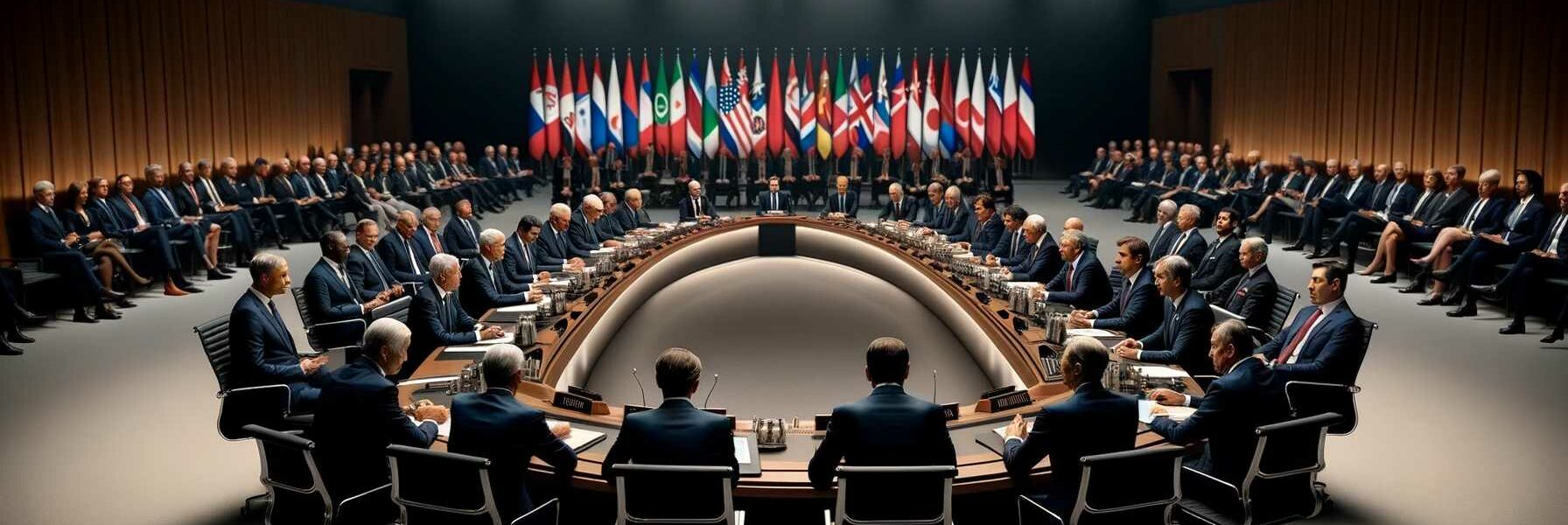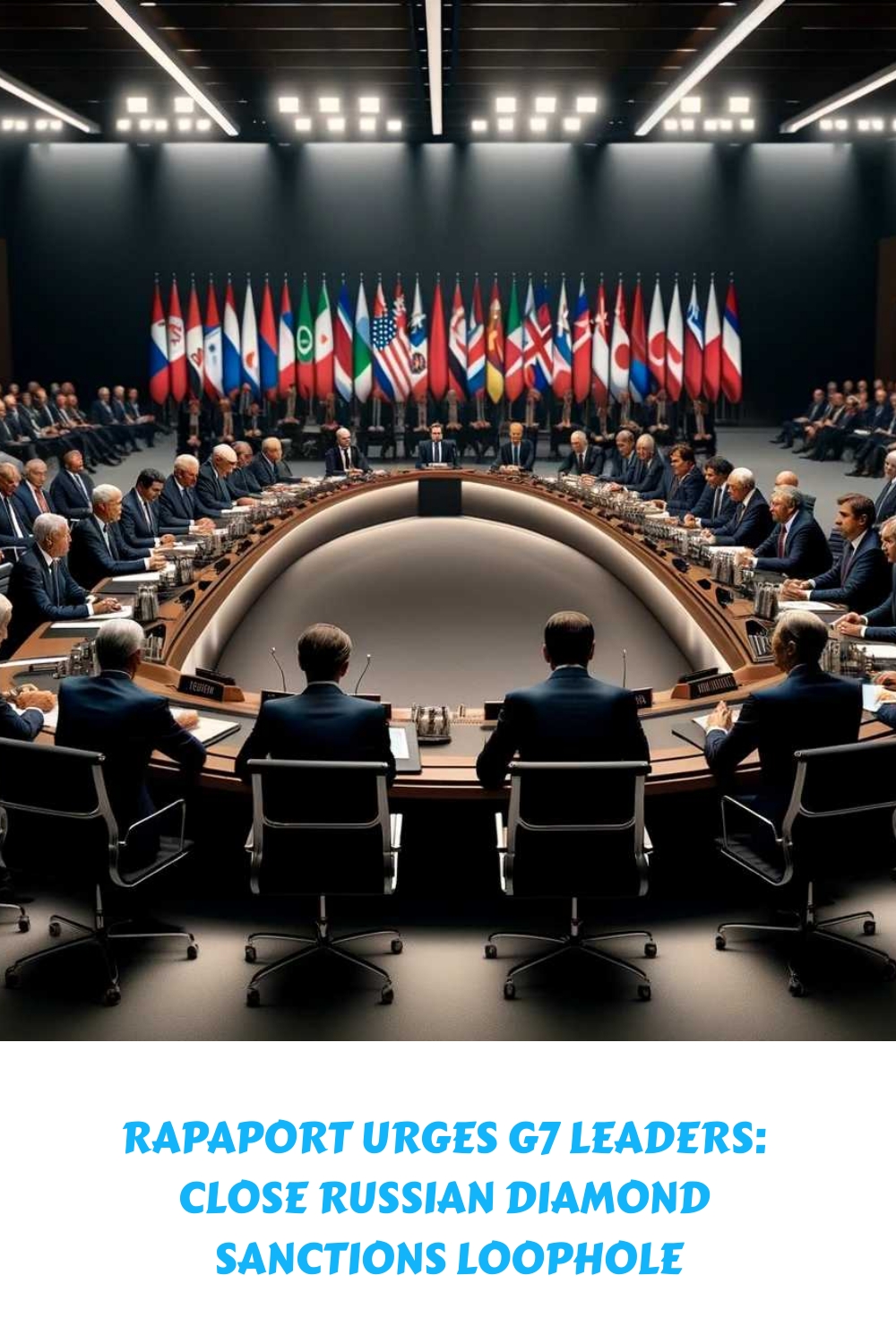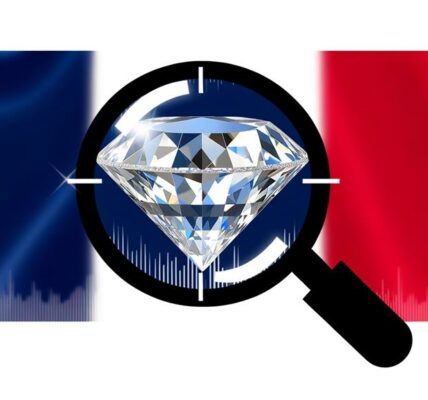In response to current geopolitical tensions, the Rapaport Group has issued a compelling call to action directed at G7 leaders. With a clear stance in support of Russian diamond sanctions, the group has emphasized the necessity of implementing robust measures and highlighted potential risks associated with existing loopholes.
The letter underscores concerns surrounding the World Diamond Council (WDC) G7 Diamond Protocol and advocates for an alternative approach. Notably, the proposed Rapaport US Diamond Protocol aims to address identified shortcomings and provide a more efficient means of restricting the import of Russian diamonds.
Furthermore, the article explores the group’s ethical stance on diamond sourcing, positioning the Rapaport Group as a prominent voice within the diamond and jewelry markets.
Article Contents
- 1 Key Takeaways About Russian Diamond Sanctions
- 2 Rapaport’s Support for Sanctions
- 3 Concerns About WDC G7 Diamond Protocol
- 4 Alternative Rapaport US Diamond Protocol
- 5 Opposition to Whitewashing Sanctioned Diamonds
- 6 Rapaport Group Overview
- 7 Rapaport’s Ethical Responsibilities
- 8 Call to Action for G7 Leaders
- 9 Conclusion
- 10 Frequently Asked Questions About The Russian Diamond Sanctions
- 10.1 What Specific Measures Does Rapaport Propose to Restrict the Import of Russian Diamonds Effectively?
- 10.2 What Are Some Examples of Terms Used to Whitewash Sanctioned Diamonds From Russia and Zimbabwe?
- 10.3 How Does the WDC G7 Diamond Protocol Harm Small Companies in Favor of Big Companies?
- 10.4 What Are the Ethical Responsibilities of Buyers in Ensuring Diamonds Come From Legitimate Sources?
- 10.5 What Are the Key Services Offered by the Rapaport Group?
- 10.6 Share this:
- 10.7 Like this:
Key Takeaways About Russian Diamond Sanctions
- Rapaport Group supports sanctions against Russian diamonds and has sent an open letter to G7 leaders urging the implementation of effective sanctions.
- The group warns against fake loophole sanctions and highlights the risk of diamonds being cut in India and exported as Indian Origin polished diamonds.
- The current US loophole sanctions have been ineffective, as evidenced by Alrosas revenues remaining the same despite existing sanctions.
- The World Diamond Council (WDC) G7 Diamond Protocol contains the same loophole as existing US sanctions, enabling Russian diamonds to be imported into the US and other G7 countries after being polished outside of Russia. Rapaport warns against implementing this protocol and advocates for their alternative US Diamond Protocol that restricts the import of Russian diamonds through blockchain technology.
Rapaport’s Support for Sanctions
Rapaport unequivocally advocates for the implementation of stringent Russian diamond sanctions. In an open letter to G7 leaders, the Rapaport Group urges the enforcement of effective measures to address the circulation of Russian diamonds in global markets.
Highlighting the risks associated with the current US loophole sanctions, Rapaport warns against the potential for Russian diamonds to be processed in India and exported as Indian-origin polished diamonds. The group emphasizes the need for a more robust approach to restrict the flow of Russian diamonds, proposing a US Diamond Protocol that leverages blockchain technology for tracing and controlling diamond imports.
“Governments must honestly restrict the flow of Russian and other sanctioned diamonds. It’s time to stop the optical illusion of fake sanction. We oppose efforts by governments and the World Diamond Council to whitewash sanctioned diamonds from Russia and Zimbabwe by using terms like ‘Russian origin’ or ‘conflict diamonds.’ Buyers have an ethical responsibility to ensure the diamonds they buy come from legitimate sources like Botswana, whose diamonds fund sustainable development,”
Martin Rapaport, Chairman of the Rapaport Group.
Moreover, Rapaport stresses the ethical responsibility of buyers to ensure diamonds originate from legitimate sources like Botswana, supporting sustainable development. With over 20,000 clients in 121 countries, the Rapaport Group’s stance resonates with those seeking integrity and transparency in the diamond industry.
Concerns About WDC G7 Diamond Protocol
Highlighting the potential drawbacks of the World Diamond Council (WDC) G7 Diamond Protocol, concerns have been raised regarding its similarity to existing US loophole sanctions and the potential adverse impact on small companies in favor of larger corporations.
The protocol’s allowance for Russian diamonds to be imported into the US and other G7 countries after being polished outside of Russia has raised alarm. This loophole makes Russian diamond sanctions far less effective. Additionally, the tracing and auditing requirements within the WDC protocol are deemed unnecessary and burdensome, potentially favoring larger companies and limiting competition.
These concerns call for a reevaluation of the WDC G7 Diamond Protocol to ensure it does not inadvertently harm smaller businesses and allows for a fair and transparent diamond trade system.

Alternative Rapaport US Diamond Protocol
Through oversight from the government and blockchain technology, the Rapaport Group’s alternative US Diamond Protocol seeks to effectively restrict the import of Russian diamonds. This protocol places the responsibility on government agencies to control diamond imports by tracing the supply chain from rough to polished import.
Once the diamonds are in the US or G7 country, the documentation and auditing requirements on companies will be removed, streamlining the process. This approach offers a more efficient and effective way to restrict the flow of Russian diamonds.
Opposition to Whitewashing Sanctioned Diamonds
The Rapaport Group’s opposition to whitewashing sanctioned Russian diamonds emphasizes buyers’ ethical responsibility to ensure diamonds come from legitimate sources like Botswana. This stance underlines the importance of transparency and integrity in the diamond trade, advocating against masking the origin of diamonds from Russia and Zimbabwe.
By using terms like ‘Russian origin’ or ‘conflict diamonds’ to conceal the true nature of these diamonds, the Rapaport Group asserts that buyers have a duty to support ethical practices. Emphasizing Botswana as a legitimate source, the group highlights how its diamonds fund sustainable development.
Martin Rapaport, Chairman of the Rapaport Group, advocates for honest restrictions on sanctioned diamonds, reflecting the group’s commitment to ethical diamond and jewelry markets.
Rapaport Group Overview
How does the Rapaport Group contribute to the development of ethical diamond and jewelry markets?
The Rapaport Group, established in 1976, plays a pivotal role in fostering ethical practices within the diamond and jewelry industry. With a global presence and over 20,000 clients across 121 countries, the group offers essential services such as the Rapaport Information Services, providing benchmark Diamond Price List and industry news, as well as RapNet, the world’s largest diamond trading network.
Additionally, Rapaport Trading and Auction Services serve as the world’s largest recycler of diamonds. By providing transparent and reliable platforms for diamond trading and setting industry standards, the Rapaport Group actively contributes to the development of ethical diamond and jewelry markets, creating a sense of belonging for those seeking to operate within an ethical and sustainable industry.
Rapaport’s Ethical Responsibilities
Having established a global presence and provided essential services for fostering ethical practices within the diamond and jewelry industry, the Rapaport Group upholds stringent ethical responsibilities in its advocacy for transparent and accountable diamond trading.
In fulfilling its ethical duties, the group prioritizes:
- Advocating for Transparent and Accountable Diamond Trading: Rapaport consistently advocates for transparent and accountable diamond trading practices, urging industry stakeholders and government agencies to implement effective measures to ensure the legitimacy of diamond sources.
- Supporting Sustainable Development: The group emphasizes buyers’ ethical responsibility to ensure diamonds originate from legitimate sources, such as Botswana, whose diamonds fund sustainable development initiatives.
- Promoting Industry Integrity: Rapaport emphasizes the need for honest restrictions on sanctioned diamonds, rejecting the whitewashing of sanctioned diamonds from Russia and Zimbabwe and advocating for ethical practices that benefit the industry and support global integrity.
Rapaport’s ethical stance and responsibilities underscore its commitment to fostering an ethical and transparent diamond market.
Call to Action for G7 Leaders
Rapaport urges G7 leaders to swiftly implement robust sanctions targeting Russian diamond imports to prevent loopholes and ensure the efficacy of restrictions. To effectively address this issue, G7 leaders should consider the following measures:
| Measures | Rationale | Impact |
| Close Loopholes | Prevents Russian diamonds from entering G7 countries | Ensures sanctions’ efficacy |
| Implement Blockchain Tech | Enables tracing of diamond supply chain from Russia to G7 countries | Ensures transparency and control |
| Remove Documentation Burden | Streamlines the import process for legitimate diamonds | Facilitates efficient import control |
These steps will help in preventing the circumvention of Russian diamond sanctions and ensure that only ethically sourced diamonds enter the G7 countries.
Conclusion
In conclusion, the Rapaport Group’s call to action for G7 leaders to close the Russian sanctions loophole is critical to ensuring the ethical sourcing of diamonds and addressing geopolitical concerns.
Their proposed alternative US Diamond Protocol offers a more robust approach to restricting the import of Russian diamonds, and their opposition to whitewashing sanctioned diamonds underscores their commitment to ethical practices.
Like a diamond cutter shaping a rough stone, Rapaport’s insights and recommendations are essential in shaping the future of the diamond industry.
Frequently Asked Questions About The Russian Diamond Sanctions
What Specific Measures Does Rapaport Propose to Restrict the Import of Russian Diamonds Effectively?
Rapaport proposes an alternative protocol to effectively restrict the import of Russian diamonds by implementing government control through blockchain technology. This involves tracing the supply chain from rough to polished import, while removing unnecessary documentation and auditing requirements once the diamond is in the US or G7 country.
What Are Some Examples of Terms Used to Whitewash Sanctioned Diamonds From Russia and Zimbabwe?
Examples of terms used to whitewash sanctioned diamonds from Russia and Zimbabwe include “Russian origin” and “conflict diamonds.” Rapaport emphasizes the ethical responsibility of buyers to ensure diamonds originate from legitimate sources, such as Botswana.
How Does the WDC G7 Diamond Protocol Harm Small Companies in Favor of Big Companies?
The WDC G7 Diamond Protocol favors large companies by allowing Russian diamonds to be imported after being polished outside Russia, harming smaller companies. This enables big players to restrict auditable diamonds, reducing competition and disadvantaging smaller businesses.
What Are the Ethical Responsibilities of Buyers in Ensuring Diamonds Come From Legitimate Sources?
Buyers must ensure diamonds originate from legitimate sources, like Botswana, to support sustainable development. Rapaport Group emphasizes ethical responsibility, urging governments and the World Diamond Council to refrain from whitewashing sanctioned diamonds.
What Are the Key Services Offered by the Rapaport Group?
The Rapaport Group offers a range of services, including Rapaport Information Services, providing benchmark Diamond Price List and news, RapNet, the world’s largest diamond trading network, and Rapaport Trading and Auction Services, the world’s largest recycler of diamonds.






